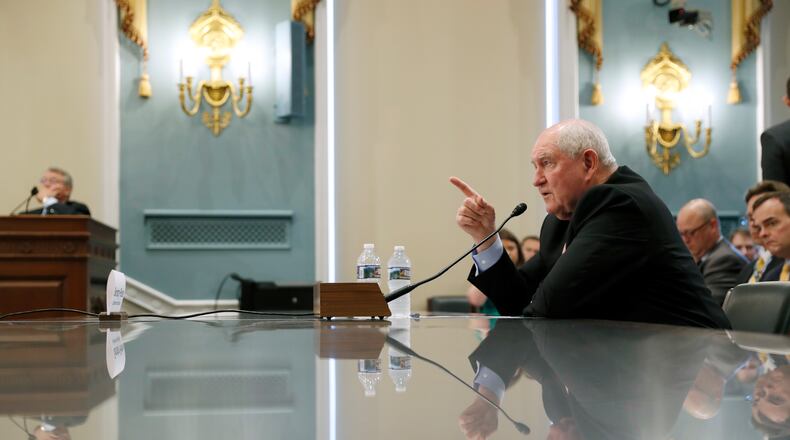Georgia's first big argument with President Donald Trump may be lurking on the horizon.
Word dripping from a leaky White House has Trump in Miami later this month, where he intends to announce the re-imposition of U.S. restrictions on contacts with Cuba, which had been loosened by the Obama administration.
Details are scarce, but you can bet that lobbyists for Coca-Cola and Delta Air Lines – the latter just opened a ticket office in Havana last December – are already working the phones.
Yet the Georgians most opposed to the renewal of Cuba’s status as a pariah state are likely to be found, not in Atlanta, but outside the big city. You may not know it, but Georgia agriculture was a leading voice for more open trade with Cuba long before it was cool. And it still is.
Then-state Agriculture Commissioner Tommy Irvin, a Democrat, made his first trip to Cuba in 2000. Only last year, Irvin’s Republican successor, Gary Black, topped a list of Georgia officials who have signed on with Engage Cuba, a Washington-based group whose goals include the lifting of travel restrictions to Cuba, and increased market access for U.S. farmers.
And then there is Sonny Perdue.
As governor of Georgia, in the last year of his second term, Perdue led a trade delegation to the communist island in 2010 – a rare move for a Republican governor.
“I’m a business guy who happens to be governor, and I’m going to be a business guy after I’m governor,” Perdue said at the time. “I think business cures a lot of ills.”
Late last year, after Fidel Castro’s death, Trump said via Twitter: “If Cuba is unwilling to make a better deal for the Cuban people, the Cuban/American people and the U.S. as a whole, I will terminate deal.”
By January, President Trump had already announced a top-to-bottom review of U.S. policy toward Cuba when he nominated the former Georgia governor as his secretary of agriculture.
One reason that Georgia farmers were giddy over Perdue’s appointment was the former governor’s stance on trade with Cuba. Agribusiness knew it would have someone at the table to counter demands by key Republicans – U.S. Sens. Marco Rubio of Florida and Ted Cruz of Texas among them — that Cuba’s Cold War-era punishments should be continued.
Trump has shown himself persuadable on trade issues. Immediately upon his confirmation, Perdue was credited with helping convince Trump that rural Americans — his own voters — would be harmed if the president abandoned the North America Free Trade Agreement with Mexico and Canada.
The same case could be made with Cuba.
Two weeks ago, Perdue went before the House Agriculture Committee, where U.S. Rep. Rick Crawford, R-Ark., made note of the role he expected the new secretary of agriculture to play.
“At this point, the White House is – right now – undergoing a Cuba policy review and considering whether or not to reverse course on our recent expansion of relations with Cuba,” Crawford said. “I just – I hope that you’ll be a vocal advocate on that score.”
Perdue said that he would. “If our folks grow it, I want to sell it. They eat in Cuba as well,” Perdue told Crawford.
In Crawford’s Arkansas, the issue is rice. In Georgia, it’s poultry. Chicken is the No. 1 U.S. export to Cuba, and Georgia is the largest chicken-producing state, according to the USA Poultry and Egg Export Council, based in Stone Mountain.
Georgia chicken has been making its way to Cuba since 2002, according to Mike Giles, president of the Georgia Poultry Federation. Giles was a member of that 2010 delegation that Perdue led to Cuba.
“Poultry was one of the first agriculture commodities that figured out how to do trade there,” Giles said. “The goods went directly to Cuba. But the financial transactions had to be handled through a third party. Banks in the United States couldn’t deal directly with Cuba.”
That’s still the case. A cash-only policy is limiting the access U.S. farmers have to Cuban markets.
During that House committee meeting last month, Crawford also pointed to a bill he’s pushing that would permit Cuba to seek out private credit in the U.S. for its purchases.
A deal is in the works, the Miami Herald reports, to neutralize Florida opposition. Crawford’s legislation would include a 2 percent fee on farm products sold to the island. The money would be to compensate those whose property was confiscated by the Cuban government during the revolutionary years of Fidel Castro.
Perdue said he could support the measure. U.S. Rep. Mario Díaz-Balart, R-Florida, an advocate for continued Cuba punishment, has yet to sign on.
Congress’ appetite for continued sanctions against Cuba is on the wane. A group of 55 U.S. senators reintroduced a measure last week to repeal all remaining restrictions on travel to Cuba. (Neither Johnny Isakson nor David Perdue, Sonny Perdue’s cousin, has signed onto the bill.)
Given that President Barack Obama loosened restrictions on Cuba through executive orders, there is some expectation that Trump would do the same.
Consistency hasn't been a hallmark of the administration, but some agribusiness leaders are taking heart from a laissez-faire line in the president's recent speech in Saudi Arabia. "We are not here to lecture — we are not here to tell other people how to live, what to do, who to be, or how to worship," Trump said.
But if the president’s rewrite of U.S. policy toward Cuba is an executive branch affair, that indeed could put the onus on president’s new secretary of agriculture.
He’ll have some expectations weighing on him. “When you have someone that has the background that Secretary Perdue has in trade relations and export opportunities and moving Georgia-grown products through our ports – this guy, he’s in the catbird seat,” said Bryan Tolar, president of the Georgia Agribusiness Council.
No pressure there.
About the Author



